#Malian army
Explore tagged Tumblr posts
Text
An army camp in the Malian city of Timbuktu on Monday was under attack by "terrorists" and heavy gunfire was heard, military and local officials and residents told AFP.
Junta-ruled Mali has been gripped since 2012 by violence from jihadist groups linked to Al-Qaeda and the Islamic State group as well as community and criminal groups.
"We are dealing with terrorists attacking Timbuktu. We are fighting back," a military source said.
"The camp in the city centre has been attacked," the source added.
A local official said: "The terrorists arrived today in Timbuktu with a vehicle packed with explosives. The vehicle exploded near the (military) camp. Shooting is currently continuing."
UN staff were instructed in a message "to take shelter" and "stay away from windows" due to "shooting in the city of Timbuktu".
Read more 'Time to move on': France faces gradual decline of influence in Africa
A resident reported having heard "heavy gunfire in the city" which "seems to come from the side of the (military) camp".
A local journalist speaking by telephone said "the city is under fire".
"This morning our city was attacked by terrorist groups. Shots were heard near the military camp and the airport. We all returned home," he said.
The ancient city of Timbuktu, once known as the "city of 333 saints" for the Muslim holy men buried there, was subject to major destruction while under the control of jihadists in 2012 and 2013.
10 notes
·
View notes
Text
Had a fun game of Age of Empires 2 with my sisters.
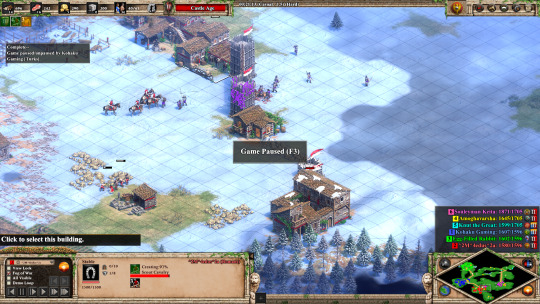
It all started with a very unfortunate accident. My little sister @thirteen-jades had a gate issue due to her defending units keeping it open long enough for a big enemy army to come through.
This created a crisis, since her army was not well prepared for such an early push, especially with the Vikings coming to reinforce the Malians with knights.
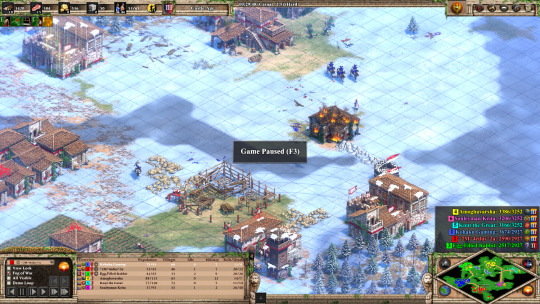
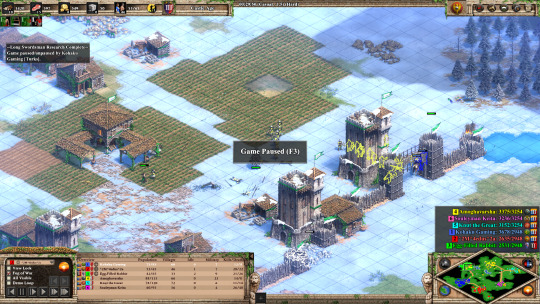
My sisters were on the flanks, with me at the back. Shortly after Jade's crisis @cyberbun also got attacked while her own army was away to protect Jade.
However, it was not in vain. Her intervention (serjeants building a donjon by Jade's gate and maintaining a trickle of production there) helped cut off enemy reinforcements and help Jade clean up and stabilize.
While this was happening, I used the fact that I was the "pocket player" at the back of the team plus the fact that I rolled Turks after choosing random civ to just boom as hard as possible while reinforcing them with light cavalry.
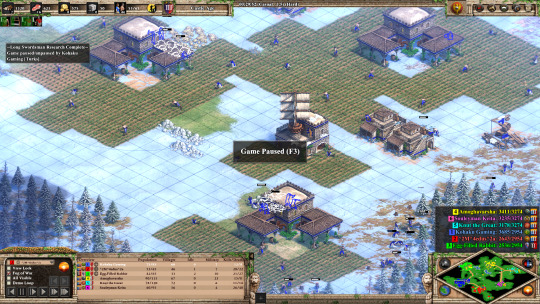
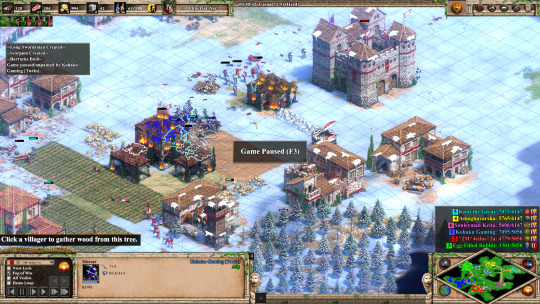
These reinforcements helped save Jade from another big ram and infantry push. The enemies just didn't stop coming there. Once I had a castle up, I started producing janissaries to protect Jade's base and help it stabilize.
However, Lottie's base was pretty much lost. She contemplated resigning, but was persuaded to retreat to my base instead and rebuild there.
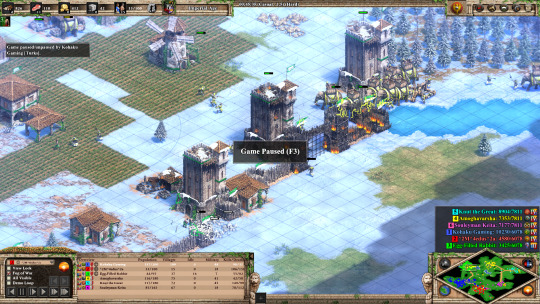
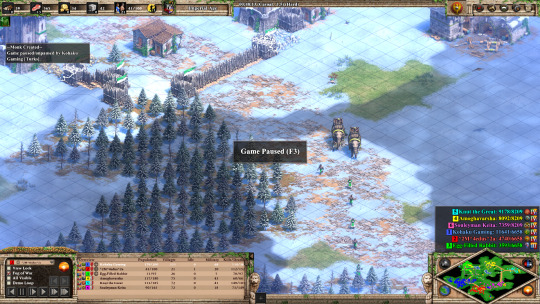
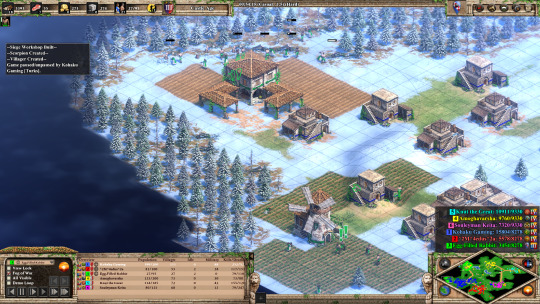
My economy was muscular enough at this point that I could more than afford giving her some additional resources to get her set up. Her new position lacked resources other than wood and farms for food, but with a market and some trade with Jade things can get better from there.
The biggest advantage is that it's a very safe position due to it being a closed map. Enemies would have to either chop through the forest or go through me to get to her survivors.
On the other side of the map, I assembled a big enough force of hussars, janissaries, and bombard cannons to start pushing the Malians away from Jade's base and even start attacking the Vikings as well, beating them both in a 2v1.
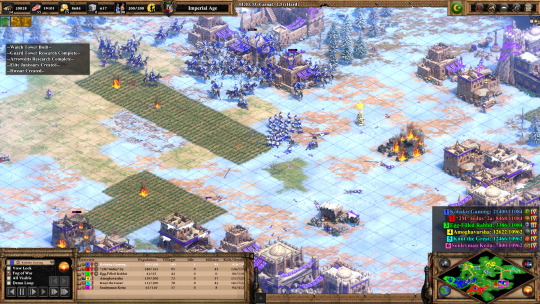
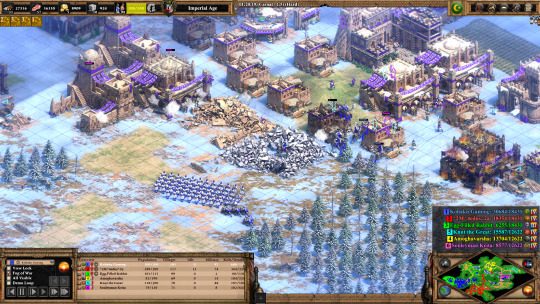
Given time to breathe, my sisters rallied and launched a 2v1 of their own against the Dravidians who destroyed Lottie's base.
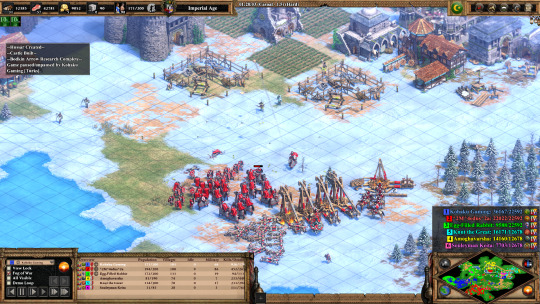
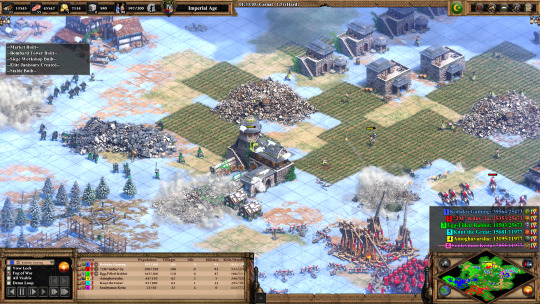
I finished offthe Vikings shortly after, with Dravidians following behind them.
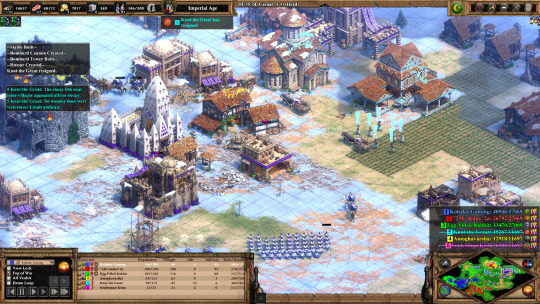
And the result was a total sister victory from the underdog position. Glad we didn't give up when overrun.
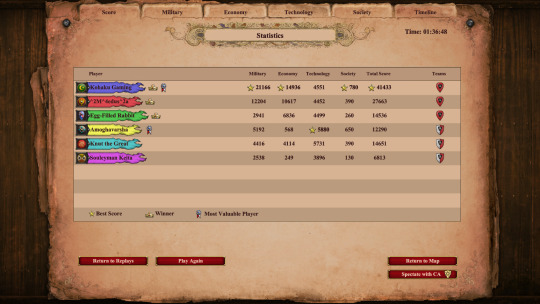
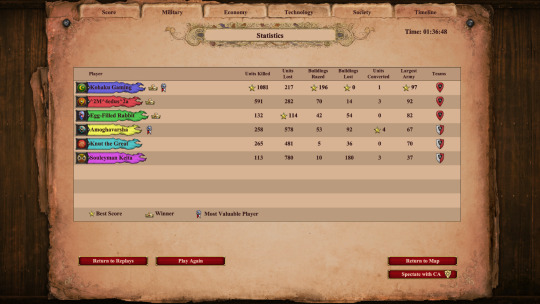
16 notes
·
View notes
Text

Destroyed Russian mercenary PMC Wagner's armored vehicle, Mali, July 2024. Source: Cloooud
P.S. Very interesting news are coming from Mali: Russian terrorists from PMC Wagner and their allies from the Malian army attempted to take the city of Tinzahuatin, but were totally annihilated. The Mi-24 attack helicopter covering the Russian mercenaries was quickly and professionally shot down, the Wagnerian armored vehicles were blown up with mines and FPV drones; at least 80 mercenaries and Malian army soldiers were destroyed very quickly and several were captured. Among the fallen are the administrator of the well-known Russian Telegram channel Gray Zone (500k subscribers) and one of his commanders PMC Wagner Anton «Lotus» Yelizarov. He commanded the Russian troops advancing in the Bakhmut direction. Awarded "Hero of Russia"...!
I don't believe in coincidences! It seems that Russian war criminals and supporters of Putler, who have committed war crimes in Ukraine, Syria and elsewhere, will also be punished in Africa...!!!


10 notes
·
View notes
Text
Little did wannabe warlord and catering magnate Yevgeny Prigozhin realize his short-lived mutiny would result in his demise, leaving behind a legacy—and admirers—far beyond Russia’s borders, particularly in China, where Prigozhin has become a cult figure on closely monitored social media.
Prigozhin’s following among top military bloggers on Weibo, one of the largest social media platforms in China, mirrors that in Russia. From Moscow to Beijing, Prigozhin is seen as the embodiment of a more vigorous and genuine patriotism, a man who prioritized the motherland’s interests over his own life. He is celebrated as a man of the people, despite the wealth he generated from the Wagner Group’s operations.
His blunt criticism of Russia’s top military leaders bolstered his image as a truth-teller willing to risk his life. This resonated in China, where a purge of top military officials in the People’s Liberation Army is underway due to accusations of corruption and of betraying the ideals of the Chinese Communist Party (CCP).
Amid rising tension between Beijing and Washington, many Chinese military bloggers suspect U.S. involvement in Prigozhin’s death, despite there being no evidence of this. A poll on Weibo, limited to 1,000 respondents, showed a majority asserting that the United States orchestrated Prigozhin’s plane crash to incite civil war in Russia. A smaller number of voters pointed the finger at Russian President Vladimir Putin, stating that allowing Prigozhin to walk away unpunished could set a dangerous precedent.
Affection for the Wagner Group is seen by the CCP as a double-edged sword in online Chinese debate. On the one hand, it illustrates the need for empowered Chinese private security companies that protect Chinese citizens and infrastructure abroad. On the other hand, it raises the specter of heavily armed security professionals pursuing a domestic political agenda.
China’s leading security pundits—academics, former military officials, and amateur bloggers—are enamored by the Wagner Group’s bravado and attitude of getting things done no matter what. They argue that the current Chinese approach to the protection of Chinese interests overseas is passive and advocate for more assertive, Wagner-style tactics. The setbacks in counterterrorism operations in Mozambique and the recent slaughter of Wagner operators by Malian Tuareg rebels have largely gone unnoticed. Some bloggers, with several million followers each, see Wagner as the model for Chinese private security companies protecting Belt and Road projects and infrastructure across the globe in high-risk areas.
From Asia to Africa, Chinese overseas workers are facing rising threats, with kidnappings and deaths becoming more frequent. In March 2023, nine Chinese nationals were killed when gunmen attacked a mine in the Central African Republic. Just a year later, in March 2024, five Chinese engineers were killed in a suicide bombing in Pakistan, and another such attack occurred this month, leading Beijing to call for more security. Moreover, Chinese security bloggers’ praise of Prigozhin and his mercenaries as liberators who were a more effective fighting force than the Russian military in Ukraine amounts to a veiled stab at top managers of China’s military-industrial complex, who were fired for accepting bribes and producing low-quality military equipment.
Therefore, it appears likely that China’s strict social media filtering allows such commentary intentionally, as it aligns with the government’s agenda. However, the boundaries of acceptable online discourse can shift suddenly, posing a risk for bloggers if Beijing’s stance on Wagner or the military changes abruptly.
Registered by Weibo with their government-issued IDs and legally responsible for the blogs, the pundits and analysts reflect one strand of government thinking. China’s Great Firewall keeps references to Wagner focused on Ukraine, but the group’s activities in Africa and the Middle East are also mentioned.
Online Chinese discussion frames Wagner’s African operations as support for decolonization and the countering of the West’s neocolonial approach and influence on the continent—basically copy-pasting Russian rhetoric. One commentator, blaming France for turmoil in Mali, took the West to task by asserting that Wagner combats “terrorism and separatism and embodies humanism.” Another microblogger suggested that China would be better off having a Blackwater equivalent rather than a Wagner Group one because “reputation is more important than anything else” and Chinese nationals would not be allowed to perpetrate the kinds of atrocities attributed to the Russian group.
From a Western perspective, this situation may seem perplexing because Blackwater, following the Nisour Square massacre in Iraq, had a notoriously terrible reputation. However, in China, Erik Prince, the founder of Blackwater, partnered with the state-owned financial giant CITIC to establish the security company Frontier Services Group in Hong Kong. As a result, the widespread global outrage and discussions surrounding Blackwater employees’ killing of Iraqi civilians never reached the broader Chinese public.
The online discussions highlight the fork in the road in which China has to determine the future trajectory of its private security companies. Influential military bloggers with millions of followers see Wagner as a model for the Chinese military and private security industry. They argue that Beijing must develop more assertive companies capable of protecting overseas Chinese nationals and investments. At the same time, there is concern that private security personnel could become an armed, uncontrollable force when they return from overseas service.
This dichotomy between ambition and fear is reflected in the portrayal of Prigozhin as a cult figure in online debates. A nuanced reading reveals Chinese netizens’ concerns about and interests in the Russia-Ukraine war, highlighting several peculiarities. Notably, Prigozhin is seen in China more as a successful CEO than as a wannabe warlord or military strategist, as is often the case elsewhere.
The Chinese public tends to prefer a businesslike approach to the militarization of security functions. In China, rising from humble beginnings to become a billionaire, despite the CCP’s call for moderation, is often viewed as a sign of tactical acumen and shrewdness. Unlike in Russia—where bloggers focus on debating Prigozhin’s military strategies—in China, Prigozhin’s business success remains a key attraction for his followers.
Supporters of the Wagner model still perpetuate the group’s aura of invincibility. One blogger recalled Wagner rescuing Chinese miners in the Central African Republic in July 2023 at the request of the Chinese Embassy. The group found the miners in a forest and “provided them with food, shelter, and security protection” before escorting them to the capital. Chinese public opinion largely matches the view that is prevalent in the swath of land stretching from the Central African Republic to Niger, inundated by Russian propaganda and disinformation that makes no mention of mass slaughters and gender-based violence, and perceives Wagner mercenaries as liberators rather than oppressors.
In life, Prigozhin served Putin by keeping the military’s top brass in check. In death, the Prigozhin myth in Russia is a useful catalyst that directs anger at the military instead of the president and inspires future Wagner recruits. In China, even among Wagner’s biggest boosters, Putin’s description of Prigozhin as a “talented person” who “made serious mistakes in life” remains a warning for Chinese private security entrepreneurs not to cross the party’s red line.
Years ago, a similar debate erupted on Weibo, calling for reforms in China’s private security sector, inspired by the rise of Blackwater. These reforms never took shape—and they are unlikely to materialize now as envisioned by Wagner fans. Even with Wagner’s perceived success, the CCP guards its monopoly on force tightly, with the Maoist principle that the party must control the gun still firmly in place.
The myth of Prigozhin, even within China’s strict narrative control, serves a dual purpose: It fuels ambitions for a stronger, tightly regulated Chinese private security sector while also acting as a cautionary tale about the dangers of contractors turning on their own leaders.
6 notes
·
View notes
Text

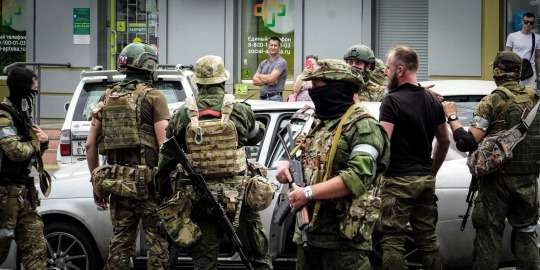
MALIAN SOLDIERS AND foreign fighters, identified as members of the Russia-linked Wagner Group, have committed extrajudicial executions and forced disappearances of dozens of civilians in central Mali since December 2022, according to a new Human Rights Watch report shared with The Intercept. Researchers found that the longtime U.S.-backed Malian military also tortured detainees in an army camp and destroyed and looted civilian property as part of its protracted campaign against militant Islamists.
The Malian soldiers committed the atrocities in four villages in the center of the country, according to telephone interviews with 40 people knowledgeable about the abuses, half of them witnesses to the violence. Witnesses told Human Rights Watch that foreign, non-French-speaking armed men whom they described as “white,” “Russians,” or “Wagner” participated in most of the attacks.
In December 2021, the Malian junta reportedly authorized the deployment of Wagner mercenary forces to fight Islamist militants after close to two decades of failed Western-backed counterterrorism campaigns in exchange for almost $11 million per month and access to gold and uranium mines. Since then, Wagner — a paramilitary group led by Yevgeny Prigozhin, a former hot dog vender turned warlord — has been implicated in hundreds of human rights abuses alongside the country’s military, including a 2022 massacre that killed 500 civilians.
Human Rights Watch’s new findings add to the grim toll.
“We found compelling evidence that the Malian army and allied foreign fighters linked to the Wagner group have committed serious abuses, including killings, enforced disappearances and looting, against civilians during counter-insurgency operations in central Mali with complete impunity,” Ilaria Allegrozzi, the senior Sahel researcher at Human Rights Watch, told The Intercept. “The failure of the Malian authorities to identify and prosecute those responsible will most likely only fuel further violence and crimes.”
(continue reading)
98 notes
·
View notes
Text
The army of Mali, the Wagner Group allied with the army, and armed fundamentalists have all killed many civilians, committed war crimes, and caused the Malian people to live in fear.
3 notes
·
View notes
Text
Mali and the Ukraine War have a very obvious intersection:
In the case of the Mali War, however, the long shadow of the Russian state and the Ukraine War rear their ugly heads, as the same Wagner group of Nazis that were happily used by Russia to ensure Ukraine's 'deNazification' saw Russian Nazis raping, pillaging, and butchering their way across Ukraine were doing it in Mali for a long time before and are back to doing it again. Wagner is employed here by the Malian government to stay in power, in a good illustration of why dictators are bastards all over, regardless of continent or skin color, and why people who sincerely buy Russians object to Nazis at any real level should be parted from money post-haste and preferably into my pocket, at that.
#lightdancer comments on current events#black history month#african history#military history#ukraine war#wagner group#mali
2 notes
·
View notes
Text
3 notes
·
View notes
Text
Two people have been killed and five others injured after shells were fired on the historic northern Malian city of Timbuktu, the army says.
The military blamed what it called "terrorists" for the shelling.
Timbuktu, a UN-designated World Heritage Site, has been under siege in recent weeks by jihadists, leading to acute food shortages.
Back in 2012, it was captured by Islamist and Tuareg fighters, who were eventually ousted by French forces.
However, the jihadists continued to stage attacks from their bases further north in the Sahara Desert.
The insurgency was the main reason Mali's military seized power in 2020, accusing the civilian government of failing to provide security.
It pledged to end the militant attacks but in recent months it appears they have been on the increase.
In one of the bloodiest incidents, 49 people died when a river boat in the north-east of the country was ambushed a fortnight ago.
Inside northern Mali amid the Islamist insurgency
Why UN peacekeepers are being told to leave Mali
Africa Live: Updates on this and other stories from the continent
The UN peacekeeping force, which has been in the country since 2013, is pulling out at the request of the military government.
Last year, France withdrew its forces as the authorities brought in mercenaries from Russia's Wagner group.
Thursday's attack on Timbuktu, a seat of Islamic learning home to tens of thousands of ancient manuscripts, caused panic among residents, local media report.
The city's inhabitants have endured faced shortages of food, petrol and medicine since the beginning of August, when jihadists warned trucks from neighbouring regions not to enter the city.
This has led to a sharp increase in the price of those goods which are still available.
As well as reporting Thursday's shelling of Timbuktu, the army said it had foiled an attack 240km (150 miles) south-west in Léré town, killing five militants.
On Sunday, five soldiers were killed after two military camps were raided by ethnic Tuareg rebels.
An alliance of Tuareg groups that re-launched a rebellion last month said it had captured two bases from the Malian army in Sunday's fighting.
The Tuareg rebels, who want independence for northern Mali, are opposed to the army taking control of bases vacated by departing UN troops in the area. They also accuse the junta of reneging on the 2015 Algiers peace deal that ended their previous rebellion.
The Islamist insurgents have spread from northern Mali and also operate in neighbouring Niger and Burkina Faso.
The insecurity has led the army in all three countries to seize power but the jihadist insurgency has continued.
2 notes
·
View notes
Text
Al-Qaida-linked group claims attack against Mali army position near Senegal
BAMAKO, Mali (AP) — Armed men attacked a Mali community just over the border from Senegal, Mali’s military said Tuesday — an development that one expert called especially worrying as the deadly violence spreads. The al-Qaida-linked JNIM extremist group claimed responsibility for the coordinated attack on several Malian army positions in the country’s west and central regions. One position was in…
0 notes
Text
WARNING: This report contains references to killings and graphic violence that some readers might find distressing.
Videos circulating online show the moment militants killed more than 100 unarmed residents��digging defensive trenches in Barsalogho, Burkina Faso, last month.
Footage shows those killed lying in trenches dug to protect their town. Satellite images also reveal that extensive new trenches were dug around Barsalogho immediately after the massacre.
According to Collectif Justice Pour Barsalogho (CJB), a collective formed by residents in the aftermath of the attack, civilians were forced by the Burkinabè army to dig the trenches on Saturday morning, August 24, when they came under attack from Al Qaeda-affiliated Jama’at Nasr al-Islam wal-Muslimin (JNIM). Bellingcat was not able to independently verify this claim.
The CJB described the army’s inability to prevent the massacre as a “bitter failure.” The videos filmed by JNIM show militants shooting at unarmed people, and dozens of bodies scattered along the trenches. JNIM claimed it killed 300 people affiliated with the Burkinabè military. The exact number of people killed and wounded has still not been confirmed by the government, with early reports suggesting hundreds were killed. Military officials met with some victims in nearby Kaya after the attack, but neither the government nor the military has been forthcoming about events. More than a week after the massacre, the country’s president Ibrahim Traoré, has yet to release an official statement about the attack, although the Presidential Office released a report on Wednesday outlining that Malian and Nigérien officials had expressed solidarity with the victims. Bellingcat geolocated footage filmed by JNIM militants during the attack and analysed satellite imagery showing the growth of the trenches around the town.
4 notes
·
View notes
Text
Dozens dead in twin attacks on Mali army bases
French soldiers of the Barkhane force patrol the streets of Timbuktu, northern Mali. (AFP) BAMAKO – Twin attacks on two Malian army base in the northern city of Timbuktu and in the center of the country left dozens of soldiers dead, as well as at least a dozen assailants, security sources and local officials said Monday. Timbuktu came under attack and shells were also fired at the airport where…
0 notes
Text
Malian Army Foils Jihadist attack in Timbuktu as insurgent violence escalates across Sahel
The Malian Armed Forces reported Monday that they had successfully repelled a major assault on a military camp in Timbuktu, foiling what could have been a deadly infiltration by jihadist fighters. The army confirmed that 13 assailants were killed in the clash, and that arms and vehicles had been seized during the operation. According to local officials and eyewitnesses, the attack began with a…
0 notes
Text
Al -Qaeda -related group assumes responsibility
A group related to al -Qaeda says it has made a major attack on the Malian city of Bulichey and has taken control of an army base. More than 30 soldiers were killed in an attack on Sunday, according to sources quoted by the Reuters Agency, but this figure was not confirmed by the authorities. On Monday, the same group, Jama'a Nusrat Ul-Islam wa al-muslimin (JNIM), says it is aimed at the military…
0 notes
Text
Al -Qaeda -related group assumes responsibility
A group related to al -Qaeda says it has made a major attack on the Malian city of Bulichey and has taken control of an army base. More than 30 soldiers were killed in an attack on Sunday, according to sources quoted by the Reuters Agency, but this figure was not confirmed by the authorities. On Monday, the same group, Jama'a Nusrat Ul-Islam wa al-muslimin (JNIM), says it is aimed at the military…
0 notes
